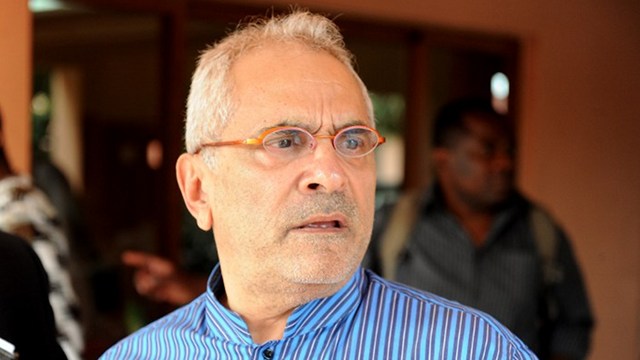SUMMARY
This is AI generated summarization, which may have errors. For context, always refer to the full article.

UNITED NATIONS – Former Timor-Leste President Jose Ramos-Horta will lead an independent review of the United Nations’ peace operations.
UN Secretary-General Ban Ki-Moon appointed Ramos-Horta as the chair of a high-level independent panel on peace operations that will look into a broad range of issues on UN peacekeeping and special political missions.
The UN chief announced Ramos-Horta’s appointment in a statement on Friday, October 31, more than a month after Ban told the UN General Assembly in September about his plan to order a review.
“The world is changing and UN peace operations must change with it if they are to remain an indispensable and effective tool in promoting international peace and security,” Ban said in the statement.
“The Panel will make a comprehensive assessment of the state of UN peace operations today, and the emerging needs of the future.”
Ramos-Horta is a Nobel laureate, and was a former foreign minister, prime minister and president of the newly independent Timor-Leste from 2007 to 2012. He has worked with the UN as Ban’s Special Representative and Head of the UN Integrated Peacebuilding Office in Guinea-Bissau.
Recently, Ramos-Horta actively campaigned for the election of New Zealand into the UN Security Council, the world body’s most powerful organ, which sets and extends the mandates of peacekeeping operations. New Zealand won a seat in the 15-member council in October.
The former Timor-Leste president has also been engaging with the Philippines on issues like the Mindanao peace process, and the South China Sea. He was the only foreign dignitary to attend the inauguration of President Benigno Aquino III in 2010.
Ban’s Spokesperson Stéphane Dujarric said that Ramos-Horta and the rest of the panel will arrive at the UN Headquarters in New York in the first two weeks of November, and then begin its work.
The group will work with the UN system and member-states, and submit recommendations to Ban for the UN General Assembly to consider in 2015.
PH issues included in review
Responding to questions from Rappler, Dujarric said in a press briefing in New York on Friday that the review will cover issues that the Philippines requested to be included after the siege involving its peacekeepers in the Golan Heights in late August.
That standoff with Syrian rebels sparked a controversy because the Filipino blue helmets defied the supposed order of their commander to surrender their weapons to the Al Qaeda-linked Al-Nusra Front, and instead hatched an unauthorized escape plan.
In letters and speeches, Philippine Foreign Secretary Albert del Rosario and the Philippine Mission to the United Nations have repeatedly asked Ban to include the following issues in the review:
- The safety and security of peacekeepers during kidnapping and siege incidents
- The accountability of UN peacekeeping mission leaders on decisions made during crisis operations
- The multidimensional contingency plans and procedures to address similar situations.
Ban said Friday that the review will consider issues including “the changing nature of conflict, evolving mandates, good offices and peacebuilding challenges, managerial and administrative arrangements, planning, partnerships, human rights and protection of civilians, uniformed capabilities for peacekeeping operations, and performance.”
Dujarric told Rappler, “I think the issues [the Philippines raised] are covered in the paragraph I read.”
The review of peace operations comes after President Aquino criticized the UN for giving its peacekeepers an “impossible or unclear mission” in the Golan Heights. The mission is formally known as the UN Disengagement Observer Force, and monitors the ceasefire between Syria and Israel.
Aquino decried the lack of weapons given to the peacekeepers, who had to deal with rebels and terrorists as the Syrian civil war spills over to the Golan. Even before the August standoff, the Philippines already decided to pull out its troops from UNDOF due to kidnapping incidents in 2013.
Philippine military chief General Gregorio Catapang Jr then also asked for an investigation into UNDOF commander Lt General Iqbal Singh Singha of India, who allegedly ordered the Filipinos to surrender their weapons in exchange for the release of kidnapped Fijian peacekeepers.
Singha initially responded by calling the Filipinos “cowards” for escaping but reversed his statement while addressing the UN Security Council in early October. The UN has been silent on the issue since.
First review in 15 years
The review is the first external assessment of peace operations to be conducted since former UN special envoy to Syria Lakhdar Brahimi led a similar evaluation 15 years ago. It is also the first panel to examine both peacekeeping operations and special political missions.
Dujarric said that the UN chief acknowledges that the presence of non-state actors like rebels and terrorists, and the evolution of technology have changed the nature of peacekeeping operations.
“We must acknowledge that peace operations today are increasingly called on to confront politically complex and challenging conflicts, often in volatile security environments where operations are directly targeted,” Ban said.
“We must take stock of evolving expectations and consider how the Organization can most effectively advance peace, assist countries caught in conflict and ensure that our peacekeeping operations and special political missions remain strong and effective in a changing global context,” the Secretary-General added.
Besides Ramos-Horta, the following form part of the panel:
- Jean Arnault (France)
- Abhijit Guha (India)
- Ameerah Haq (Bangladesh)
- Andrew Hughes (Australia)
- Alexander Ilitchev (Russia)
- Hilde F. Johnson (Norway)
- Bruce Jones (Canada)
- Youssef Mahmoud (Tunisia)
- Ian Martin (United Kingdom)
- Henrietta Joy Abena Nyarko Mensa-Bonsu (Ghana)
- B. Lynn Pascoe (US)
- Floriano Peixoto Vieira Neto (Brazil)
- Wang Xuexian (China)
– Rappler.com
Rappler multimedia reporter Ayee Macaraig is a 2014 fellow of the Dag Hammarskjöld Fund for Journalists. She is in New York to cover the UN General Assembly, foreign policy, diplomacy, and world events.
Add a comment
How does this make you feel?
There are no comments yet. Add your comment to start the conversation.